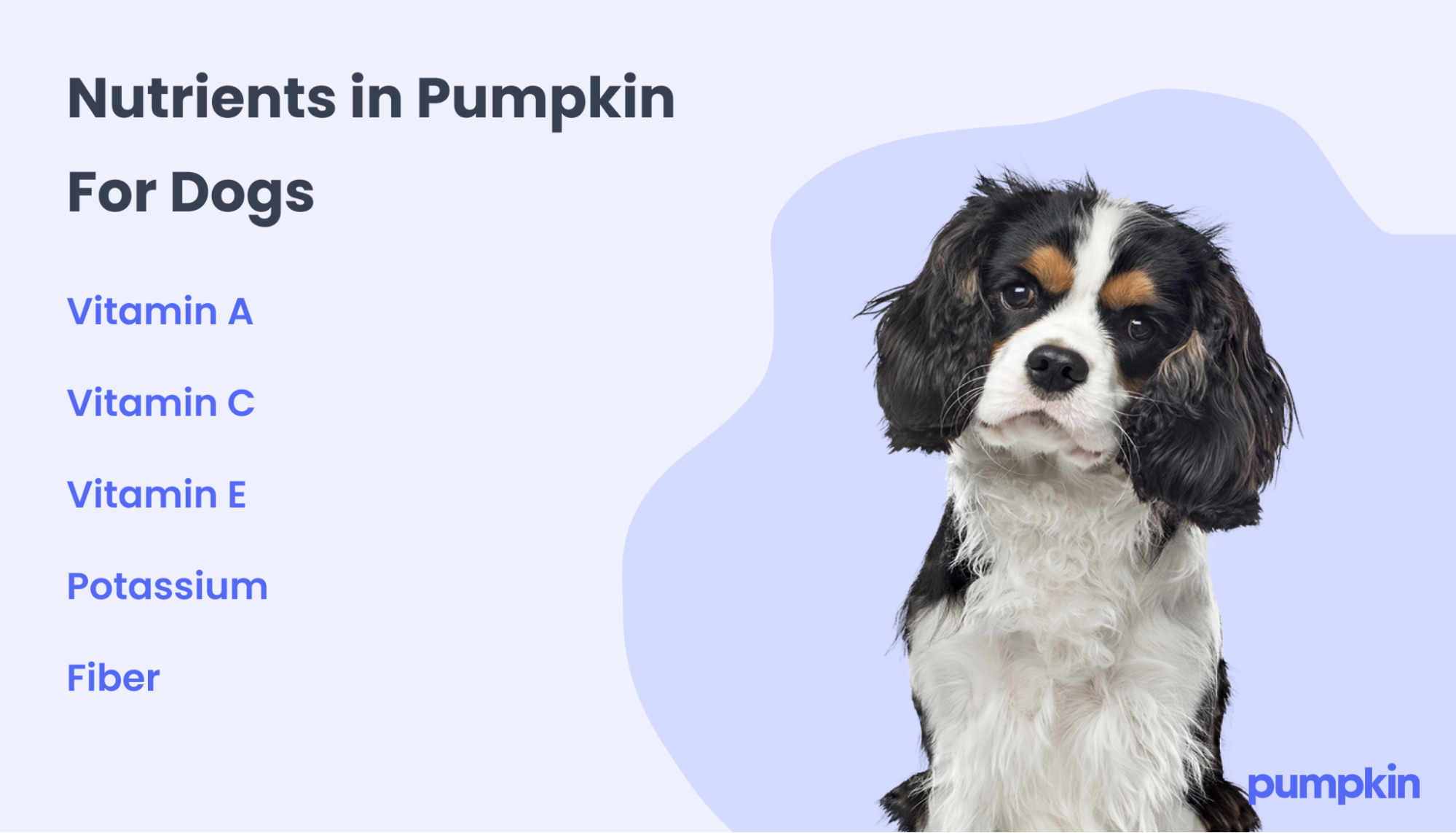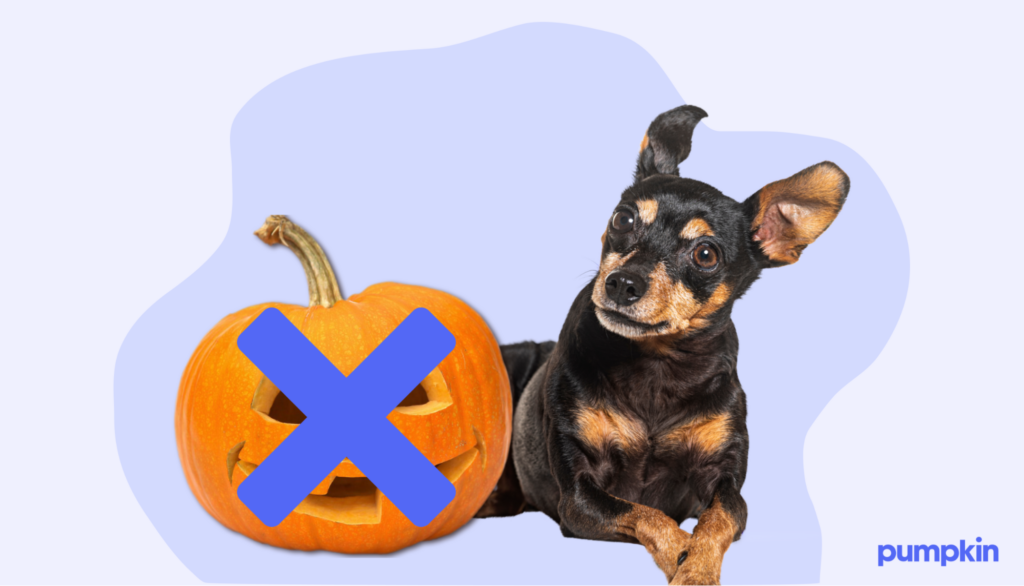Key Points
- Dogs can eat pumpkin, but it needs to be prepared properly.
- Pumpkin provides dogs with essential vitamins (A, C, and E), potassium, and fiber.
- Dogs should avoid pumpkin pie filling as it contains extra sugars, additives, and ingredients that can be toxic.
Pumpkin just has a way of making everything better, doesn’t it? This gourd pops up everywhere, from pumpkin pies on Thanksgiving to pumpkin spice lattes (or pumpkin spice everything if you’re a true fiend) and pumpkin dog treats. But before you scoop some into your dog’s dinner bowl, you’re probably wondering: Is pumpkin actually safe to share with your pup, no matter the season?
The good news: Yes, dogs can eat pumpkin. The not-so-good news? They shouldn’t be diving into your pumpkin pie or pumpkin spice treats of any kind. Still, when it’s prepared right, this popular fall and winter staple provides great health benefits for pups.
Let’s break down how to serve it safely.
The health benefits of pumpkin for dogs
Pumpkin can be a healthy addition to your dog’s diet — in moderation, of course. Between the antioxidants and vitamins, pumpkins are all-around immune system supporters.
Want the specifics on pumpkin’s health benefits for your pup? Pumpkin provides:
- Vitamin A: Key for your dog’s vision, vitamin A also plays a big role in supporting brain development.
- Vitamin C: Helps lower inflammation, supports the immune system, and supports joint health
- Vitamin E: Supports heart health and keeps dogs’ eyes in tip-top shape.
- Potassium: Strengthens muscles, keeping your dog moving and active.
- Fiber: Fiber supports healthy digestion and bowel movements.

Plus, both canned and fresh pumpkins are low in calories. Your dog will feel satisfied and you’ll know you’re sticking to a healthy weight management plan.
Fresh pumpkin vs. canned pumpkin: Which is best?
Your first thought might be that fresh pumpkin is the healthier choice. But here’s a surprise: canned pumpkin actually packs a bigger punch when it comes to fiber content and nutrients. Why? Fresh pumpkin has more water, which dilutes those essential health benefits.
So, for a nutrient boost, go with plain canned pumpkin. Just avoid the canned pumpkin pie filling that contains added sugars and spices.
Fresh pumpkin does have its perks, too — especially if you like roasting or steaming it for a little variety in your dog’s diet. Ultimately, it’s all about what suits your pup best.
Can pumpkin help diarrhea and constipation in dogs?
Yes, pumpkin can really do the trick when your pup’s struggling with digestive issues like diarrhea. Thanks to its fiber content, pumpkin can act as a natural remedy to help firm up loose stools and also get things moving if your dog has a touch of mild constipation.
Start small, though — just a spoonful or so mixed into their food. Dr. Leslie Brooks, DVM and BetterPet advisor, shared specific guidelines with Pumpkin (as in Pumpkin pet insurance, as in the website you’re reading, not the delicious vegetable):
“To help firm up the stool in cases of soft stools or diarrhea, give canned pumpkin to your dog in small amounts — no more than 1 tablespoon for a large/giant breed dog or 1 to 2 teaspoons for a small to medium breed dog, once or twice a day,” Dr. Brooks said.
And don’t forget: when adding fiber to your dog’s diet, make sure they also drink plenty of water to protect their urinary health. Hydration is key.
How to add pumpkin to your dog’s diet
Thinking of adding pumpkin to your dog’s diet? Just remember to start small — introducing too much too soon can give them an upset stomach.
Mix a bit of plain canned pumpkin puree (again, never canned pumpkin pie filling) into their dry food. You’ll also want to check the label’s ingredient list to avoid any added sugars or spices, as some, like nutmeg, are toxic to dogs.
If you’re using fresh pumpkin, make sure it’s cooked first — raw pumpkin can be rough on their digestion and cause stomach upset. Once it’s softened, your dog will happily gobble it up.
How much pumpkin can dogs eat?
Consider your dog’s size and dietary needs when testing out the right amount of pumpkin in your pup’s usual food servings:
- Small dogs (10-20 lbs) can enjoy a half to full teaspoon of pumpkin daily.
- Medium-sized dogs (20-35 lbs) can handle around one tablespoon of pumpkin a day.
- Larger dogs (35+ lbs) can eat one or two tablespoons of pumpkin daily.
These guidelines aren’t set in stone since every dog’s specific needs are different.
And just a heads up: Pumpkin is packed with vitamin A, and too much Vitamin A can lead to toxicity. So before adding it to your dog’s regular food routine, it’s always smart to check in with your vet.
How to safely feed your dog pumpkin
Pumpkin can be a healthy treat for your dog, but you’ll want to make sure you’re serving it the right way. Here’s what to know:
1. Keep it simple
Stick to plain pumpkin — no spices, sugars, or additives. Nutmeg, for example, can cause serious health issues, and even large amounts of cinnamon could upset your dog’s stomach. Always check labels for ingredients like xylitol (usually found in sugar-free canned pumpkin), which is toxic to dogs.
2. Steer clear of some pumpkin parts
Avoid the pumpkin’s skin, stringy pulp, and stems, as they can cause digestive trouble. Also, skip raw pumpkin seeds since they spoil easily.

3. Carved pumpkins are a no-go
Carved pumpkins left outside grow mold and bacteria, which can make your dog sick. Toss those out before your dog can gobble them up.
Can dogs eat pumpkin seeds?
Yes, but they need a little prep first. Pumpkin seeds are packed with tons of good stuff — vitamin A, zinc, magnesium, omega fatty acids, you name it. But before you sprinkle them into your dog’s food, it’s a smart idea to get your vet’s approval. A little goes a long way.
Once you’ve got the go-ahead, here’s how to serve them up:
- Use raw, organic seeds.
- Roast, peel, and grind them to avoid any choking hazards.
- Skip the salt — plain pumpkin seeds are best.
- Store leftovers in a sealed bag to keep them fresh.
Add pumpkin seeds to your dog’s regular meals, and you’ve got a nutritious snack they’ll love.
Is pumpkin safe for dogs?
Absolutely! Your pooch can reap the health benefits of this nutritious and tasty treat when fed the proper amount. Just remember to practice moderation. And when in doubt, ask your vet for advice.
Make sure that your pup and your wallet are protected if something goes wrong. Pumpkin Pet Insurance plans can help you afford the best care in the future by covering eligible vet bills for accidents and illnesses.
FAQs
- https://pmc.ncbi.nlm.nih.gov/articles/PMC9182978/
- https://www.ncbi.nlm.nih.gov/pmc/articles/PMC8234551/
- https://www.thedailymeal.com/1561141/buy-canned-pumpkin-more-nutritious/
- https://www.akc.org/expert-advice/health/can-pumpkin-help-with-dog-diarrhea/
- https://vcahospitals.com/know-your-pet/vitamin-a-toxicosis-in-dogs
- https://www.akc.org/expert-advice/nutrition/can-my-dog-eat-nutmeg/
- https://www.cambridge.org/core/journals/nutrition-research-reviews/article/medicinal-and-biological-potential-of-pumpkin-an-updated-review/614835C9F2CABAAAFD5E7925A72E7F9F




